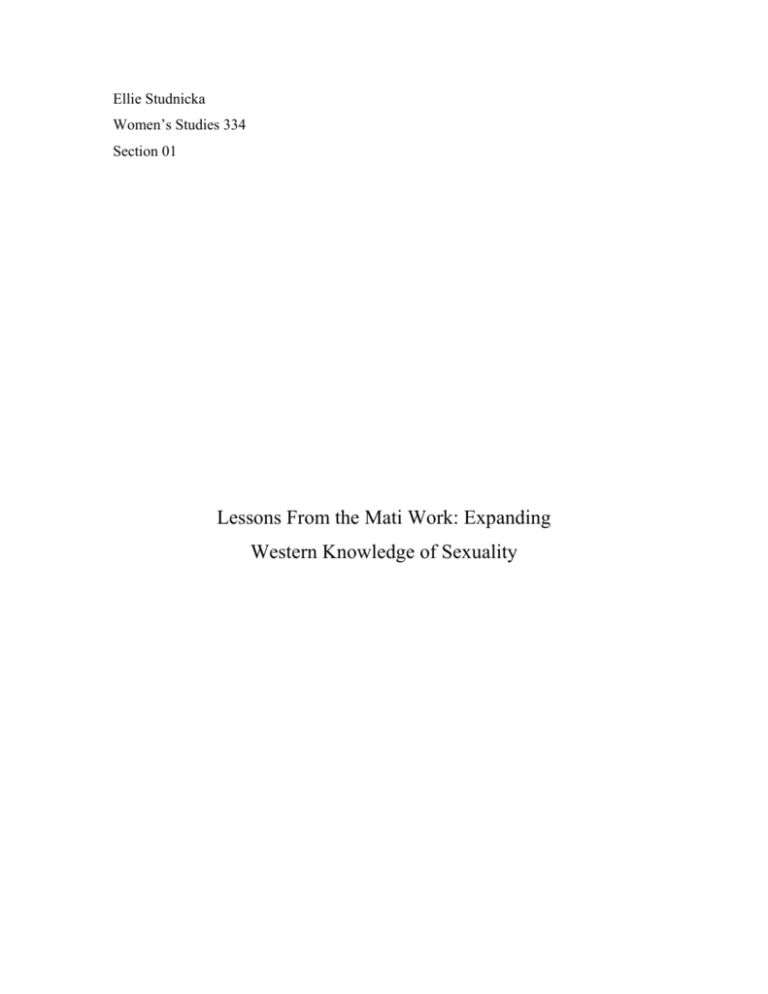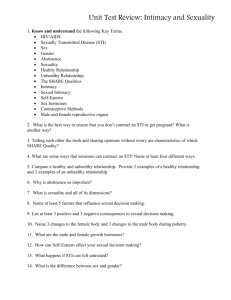
Ellie Studnicka
Women’s Studies 334
Section 01
Lessons From the Mati Work: Expanding
Western Knowledge of Sexuality
The case of mati work serves to expand our own Western understandings of sex
and sexuality, and teaches us that they are social constructions, which are neither static
nor universal. Additionally, the mati work examples a model of kinship ties that is vastly
different from our own, and challenges our understanding of the functionality of family
life. This ability to compare and contrast our two cultures is made possible by
globalization, which allows information a kind of mobility that it has never seen before,
and serves to open up our Western conceptions of these institutions and how they operate
in cultural contexts. This paper will explore these subjects of sex and sexuality, kinship,
and globalization in terms of how they challenge our currently held ideas about what it
means, culturally, to enjoy sex with those of the same sex.
To begin, let me introduce the mati work and it’s origins. The term “mati” has its
roots in the middle passage from West Africa to Surinam. “Mati” was a term used
between shipmates to express a desire to remain close or in contact after leaving the ship.
It also served to form a kinship network between individuals who had been ripped away
from their family. The mati work is a practice observed mainly by Afro-Surinamese
women who occupy the working class, in which women form emotional, physical,
intimate and sexual bonds with one another. Perhaps one of the most notable aspects of
the mati work, and one which I will discuss in some depth, is their expression of sexuality
as a practice and in terms of activity rather than identity. This operative definition of
sexuality also allows room for non-exclusionary sexual practices, and offers an
explanation of these women’s sexual relationships with men despite simultaneously being
involved in mati work.
In great contrast to Western culture, the working-class Afro-Surinamese culture
studied in Wekker’s ethnography Politics of Passion defines its sexuality in terms of
practice and activity, whereas we in the West define sexuality as a part of a person’s
impenetrable identity. In the U.S., for example, a woman who enjoys sex with only other
women would say, “I am a lesbian.” In contrast, a similar woman from Suriname would
say, “I do the mati work.” In her very first chapter Wekker discusses her both
professional and personal relationship with a woman named Misi Juliette. One evening,
Wekker asks her “ ‘Juliette is a mati, no?’ i.e., are you a mati? Impatient as such
stupidity, she answered me: “Ma di m’ e srib’ nanga umasma, dan m’e mati”/But since I
am sleeping with women, then I mati. In using the verb na/to be and the noun mati,
asking her whether she belongs to the category of mati, I was inscribing an identity for
Juliette, whereas she was answering me in terms of verbs, that is, describing her behavior
and actions” (Wekker, 2006; 13). This idea of sexuality as practice rather than identity
challenges our Western ideas of sexuality and the concept of choice or lack thereof when
it comes to ones sexuality.
The mati work also calls into question specifically, the Western ideas of female
sexuality, in that the Afro-Surinamese understanding stands in stark contrast to our own.
As Wekker states, “Mati work challenges received notions of female sexuality as passive,
muted, and non-genital, in that it is the opposite of all these characteristics. It is active,
vocal, often genital oriented, and above all, self-driven. Women are conceived as sexual
beings who can act on their desires” (Wekker, 2006; 73). Sexuality is something that we
often take as a natural phenomenon in the sense that we believe it is both felt and
experienced in the same way universally. However, this example shows us that this is not
so, and reveals that sexuality itself is a social construction which differs across cultures.
In addition to allowing this kind of flexibility when it comes to sexuality, the mati
work also allows something to its participants that Western women are often denied:
subjecthood. Wekker argues that, “underlying the mati work are West African principles
in the domain of sexual subjecthood, which underwrite sexual subjecthood for women
and take it for granted that women have sexual desires and can act on them” (Wekker,
2006; 120). In other words, the roots of the female, working-class, Afro-Surinamese
culture in West African culture provides them with this separate conception of sexuality
that allows much more freedom and personhood than our Western one.
Given that the women of this study define their sexuality in terms of practice
instead of identity, one of the most important aspects of the mati work is sex itself. In her
first chapter regarding Misi Juliette, Wekker is surprised by Misi Juliette’s enthusiasm
and her liveliness despite her age. She writes, “I have understood Juliette’s zest for life
and sex in the context of a culture that grasps sexuality as an extraordinary joyful and
healthy aspect of life,” (Wekker, 2006; 22). This selection brings to light the ideas about
sex and its place in life and love that are held by the people studied in Wekker’s
ethnography. She later adds, “Many women consider sexual activity as healthy, joyful,
and necessary. The organization of the fulfilling of passion in this Creole universe shows
that there is no one “natural” way of going about one’s sexual business” (Wekker, 2006;
119). Western cultures have a propensity for labeling abundant sexual activity and
finding joy in sex as shameful and sinful due to our predominately Christian dialect on
the subject. However, the culture Wekker presents here embraces their sexuality with
both joy and pleasure. Taking this into account, the example given by the mati work
teaches us that our typical Western constructions of sex and it’s place in our lives can be
damaging and shameful, and if reevaluated it can be put into a healthier and more
accepting perspective.
While those who do mati work prefer female sex partners, they do sometimes
engage in sex with men. The two reasons women who prefer the mati work choose to
have sex with men are for children and for money. Because they desire children and
clearly cannot conceive with their mati partner, many women will to turn to men with the
specific intent of having children. In addition to reproductive ends, women often view
having sex with men as a way to obtain money. However, this business is not conducted
in the structure of prostitution. Women enter into a relationship with a man understanding
that he will expect certain things from her, and that she in turn will demand other things
from him. Chiefly, the women in Wekker’s ethnography expressed that what they wanted
in exchange for their relationship with men was money, support, and in some cases
access to health insurance. Some or all of these things they can receive, in exchange for
sex and other small favors. As Wekker explains, “Sex is ‘what men want’ and one of the
few strong negotiating bases that women can command. Sex then, often becomes a means
to an end” (Wekker, 2006; 150). The dire state of the Surinam economy leaves it’s
citizens fairly dependent upon some kind of access to foreign currency, but the jobs
which are most accessible to the working-class Afro-Surinamese women do not pay
foreign currency. Therefore, if a woman has no friends, relatives, or children in the
Netherlands to help support her, she is left with a high dependency on men (who have
more access to jobs paying foreign currency), and she buys this support with her body.
This relationship between resources and sex examples for us the transactional nature that
sex can take on in the Afro-Surinamese working-class culture.
For women who do the mati work then, sex with women is where they find their
pleasure. Those who do mati work have sex with women not solely for the things which
they will receive in return, but for love, companionship, and pleasure. These women form
not only sexual bonds, but emotional and intimate ones as well. Wekker explains some of
the mati work culture when she says “Mati are part of and form a configuration in which
women unabashedly enjoy sex; they talk about it openly, within parameters of mutual
trust; they take it seriously, in the sense that sex is important to them; it is seen as healthy
and as an extremely joyful and exciting part of life” (Wekker, 2006; 73).
However, this is not to say that a mati relationship is without its rules and
obligations. Mati have certain obligations to one another including support in times of
illness or a death in the family. This is where the ‘work’ in “mati work” comes into play.
In addition, Mati do not always participate in monogamous relationships. There are
several layered and complex sets of obligations to be observed when one mati chooses to
have a relationship on the side. Similar to relationships with men who are already in a
cohabitation relationship or are married, a mati must pay respect first and foremost to her
first or main partner. Likewise, the other women who she sleeps with should respect the
first mati, and not make their presence too obviously felt.
I believe one of the most noteworthy aspects of mati work culture and how the
conceive of sex is their ability to express their desires and pleasures openly and honestly.
This kind of acceptance of sexuality and expression of pleasure in sex was not observed
by Wekker in those working-class women who did not do the mati work. In her chapter
exploring the relationships between Afro-Surinamese men and women, Wekker notes
“working-class women who mainly operate in the cross-sex domain have a less clearly
defined picture of what their pleasures are, and what to do to get them, than women who
are active also in female-female dyads. The latter group has extensive sexual knowledge,
skills, terminology, and experience as to what feels good and what does not, and in
general they convey a more definite sense of how fun sex is to them in itself rather than
merely as an instrument for economic security” (Wekker, 2006; 156).
However, one instance where both cross-sex and same-sex participants do not
differ is in the kinship system. While discussing the growth of the job market for men and
women, Wekker notes “the inegalitarian income situation is facilitates by the false,
patriarchal premise, upheld in powerful discursive formation that includes the state,
business, and much commonsense thought, that women have a male head of household at
home and thus need only worry about additional income” (Wekker, 2006; 66). In addition
to highlighting the economic dependence that working-class women have on men, it
underlines the fact that the majority of women do not have a male head of household. In
her fourth chapter, which unpacks the relationships between men and women, Wekker
uncovers that “women as mothers are economically and psychologically central in their
households, while men in their roles of husband-father are rather marginal to domestic
affairs” (Wekker, 2006; 199). This also explains why, in the context of this specific
culture, women are the most important and influential members of a family unit including
one’s mother, sisters, and aunts. In the working-class Afro-Surinamese culture, women
operate as heads of household, and “kinship ties are formed through and between
women,” following a matrilineal pattern that does not always necessarily reflect biology
(Wekker, 2006; 76). This neglect of biological lineage occurs because “children are
easily exchanged between households” between the biological mother and her mother,
her sisters, and her mati (Wekker, 2006; 23). This exchange of children then creates a
familial bond that is founded not on biology, but rather emotional ties to the woman who
has raised the child or been a major part of their life. In the first chapter of Politics of
Passion, Misi Juliette explains her lack of a strong connection to her mother, having been
raised by her aunt. She also explains to Wekker that children can be exchanged between
mati. The giving of ones children to someone who has not become a permanent part of
our family may seem strange and disturbing to our Western conceptions of family, but
according to Wekker, “these family ties remain intact, even when the women involved
have separated or have died” (Wekker, 2006; 24). Misi Juliette explained that, having
been in a more than 40-year relationship with a woman named Misi Coba, her children
had formed emotional ties to Coba, and Coba’s to her. Years later, despite being
separated from their mother for some time, Coba’s children still came to visit her, and
considered her family.
As before mentioned, the working-class population in Surinam is highly
dependent upon foreign currency, particularly from the Netherlands, which was the
empirical power that ruled over Surinam in its days of slavery. Due to this dependence,
many citizens, if they can acquire the funds, choose to immigrate to the Netherlands at a
very high rate. As a result, much of the culture of mati work has crossed the equator, and
brought with it the globalization of sexuality. Wekker explains that sexual globalization
refers to “the various ways in which the rapid flow of capital, people, goods, images, and
ideologies across national boundaries…structures the domain of sexuality” (Wekker,
2006; 223). In this context, the sexuality of the mati work has crossed the borders of the
Netherlands, clashing with the Western idea of lesbianism and causing a merging of ideas
for those who occupy both cultures. However, as Wekker notes, “globalization offers
opportunities, but it also exacerbates existing inequalities between North and South,”
with the North being the Netherlands and its modern Western ideology, and the South
being Surinam and it’s traditional ideology (Wekker, 2006; 247). In globalized discussion
of sexuality, the Western ideas of identity and “lesbianism” are often assumed to be
normative, and are then imposed on other cultures, with the expectation that when given
this model, other cultures will see it as superior to their own and adopt it. Wekker
explains this when she states, “the often implicit and sometimes explicit expectation is
that in the meeting of these two models lesbianism will, sooner or later, prevail; the mati
work will give way to the dominant Euro-American form of female same-sex desire. This
expectation is alive in commonsense discourses, but it is also fed by academic discourses
that see…a triumphant progress and transfer of sexual forms and identities from the West
to the Rest” (Wekker, 2006; 225).
Given this view of future discourse on sexuality, it is important to consider the
implications of an acceptance of Western sexuality concepts. In Surinam, the practiced
religion is Winti, which invokes an intricate cosmology of Gods and Goddesses. This
religion allows its followers a much more complex definition and conception of “I,”
referred to as the multiplicitous self. This multi-layered understanding of what makes a
person who they are examples a much more accepting attitude towards difference, which
is proven when Wekker notes that “the ideology embedded in Winti…considers men and
women to be complex, mulitplicitous beings who are not in a hierarchical relationship to
each other” (Wekker, 2006; 115). Already, this system has shown the absence of an
article of oppression that has plagued Western and other societies for the majority of
history: the hierarchy of gender and sex. Wekker also notes that “Winti is an enabling
discourse, opening up possibilities for people, while Christianity is forbidding, limiting,
exclusionary, dismissing same-sex behavior and offering people who like to engage in it
a negative self image” (Wekker, 2006; 46). This passage especially brings to light the fact
that Western discourse on sexuality is predominantly Christian, and therefore brings with
it the shame and condemnation that come from finding joy and pleasure in sex in the
Christian faith. Further than simply forbidding and dismissing same-sex relationships,
Christianity also condemns it, as Wekker observes, “The…Christian discourse is far more
punishing, demanding, and oppressing [than Winti]: it brings [Misi Juliette] to ask God
every night for forgiveness for her sexual behavior with women. The behavior that, as we
have seen, she so enjoyed, that gave her immense pleasure in her life, and that, in a very
real sense, made her survive, is deemed unacceptable” (Wekker, 2006; 45).
When given the contrasting ideologies between that of the Surinamese/Winti
(sexuality as practice, accepting, complex, enabling, and offering subjecthood and
equality to both sexes) and Western/Christianity (sexuality as identity, demanding,
forbidding, condemning, offering negative self-images, and maintaining notions of male
activity and female passivity) it is difficult to imagine that the Christian model will
prevail in the way Western scholars expect it to, or that it should. If offered the choice
between these two dialects, not only on same-sex relationships, but also on sex, women
come out ahead in the Winti constructions. One can only hope that globalization will
deliver acceptance and equality to the West, and not condemnation and misogyny to the
Rest.









